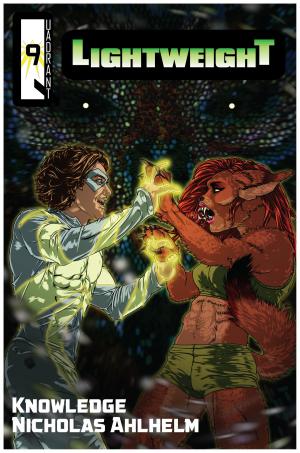The Wars in Cyberspace II
Fiction & Literature, Coming of Age, Science Fiction & Fantasy, Science Fiction, Adventure| Author: | Ludvig Solvang | ISBN: | 9781370820689 |
| Publisher: | Ludvig Solvang | Publication: | February 12, 2017 |
| Imprint: | Smashwords Edition | Language: | English |
| Author: | Ludvig Solvang |
| ISBN: | 9781370820689 |
| Publisher: | Ludvig Solvang |
| Publication: | February 12, 2017 |
| Imprint: | Smashwords Edition |
| Language: | English |
It's all about space. Does space exist in Real World, and in Cyberspace? And what if all possible solutions are excluded, and we understand, that's all in our heads?
In Real World we are restricted to the Earth's surface, most of us. Cyberspace, on the other hand, is infinite; like an envelope inside an envelope inside...
And as real space is suspected to be only one among other spaces, similar might be the case for Cyberspace. A set of impossible coordinates suggests so, and tech whiz Nkwabe is left in despair.
Robin is doing social engineering. Unknowingly his double agents are spreading rumours about an enemy within in the Germania world. What will happen in a game society that is based on paranoia and a questionable myth, when the word about sabotage spreads?
When things begin to get real complicated, it's too much for even the greatest minds. Dragon Master Slive works only with models. She applies some of them in Technical Cyberspace, which is a model itself. Algorithms are visualized in a Cyberspace like environment, the result of an evolution where everything is built on earlier technologies. It's also containing earlier flaws.
The portal to the Germania world has been locked, but Slive manages to create a thin tunnel to the Germania world itself. That means, Bazan and his gang can only get their avatars through, not any tools or weapons. That's absolutely an disadvantage in a hostile world, and their adventure is nearly brought to a premature end.
And then, what is it with Charlie? He's an algorithm brought up like a human, showing peculiar abilities from time to time.
Evolving worlds are in fashion. The Germania world is displaying deadly pterodactyls, and Charlie domesticates them so The Outcast gang can use them as air horses. Phioz asks again; "What is it with Charlie?"
When mobile, Bazan and his friends are able to utilize flaws in game mechanics. They start acting like regular gamers. No one understand that they are foreigners in the chaos emerging after the hostile aliens invaded the Germania world from outer space.
Utilizing game mechanics, some of Bazan's gang take control over alien forces, and direct them at the capital Germania.
In a game, you eliminate your opponent. Some call it a kill. In Virtual Reality it can be different. Phioz has to take a break from her activity in the Secret Police, the constant harassment of other gamers became too much for her.
The Secret Police is Robin's invention. He wants so attack the very core of the gaming society, the concept of "we" against "them". While alien forces are attacking the defenders of Germania, Robin has opened a second front based on alternative facts. The Secret Police helps spread the feeling, there is an enemy within.
But the main question remains; what is the Germania all about? What is the real purpose of this eerie world? The gameplay and the evolution are not off the shelf items, it has cost money. A lot of money.
"Germania is like a brick house, with doors that can be locked," Phioz says. And she is right. The whole Germania world is locked with irreversible algorithms. Nothing can be changed without destroying it, and nothing can be maintained. That's why also the owners of the Germania world have to play by the game rules when defending their eerie secret.
It's all about space. Does space exist in Real World, and in Cyberspace? And what if all possible solutions are excluded, and we understand, that's all in our heads?
In Real World we are restricted to the Earth's surface, most of us. Cyberspace, on the other hand, is infinite; like an envelope inside an envelope inside...
And as real space is suspected to be only one among other spaces, similar might be the case for Cyberspace. A set of impossible coordinates suggests so, and tech whiz Nkwabe is left in despair.
Robin is doing social engineering. Unknowingly his double agents are spreading rumours about an enemy within in the Germania world. What will happen in a game society that is based on paranoia and a questionable myth, when the word about sabotage spreads?
When things begin to get real complicated, it's too much for even the greatest minds. Dragon Master Slive works only with models. She applies some of them in Technical Cyberspace, which is a model itself. Algorithms are visualized in a Cyberspace like environment, the result of an evolution where everything is built on earlier technologies. It's also containing earlier flaws.
The portal to the Germania world has been locked, but Slive manages to create a thin tunnel to the Germania world itself. That means, Bazan and his gang can only get their avatars through, not any tools or weapons. That's absolutely an disadvantage in a hostile world, and their adventure is nearly brought to a premature end.
And then, what is it with Charlie? He's an algorithm brought up like a human, showing peculiar abilities from time to time.
Evolving worlds are in fashion. The Germania world is displaying deadly pterodactyls, and Charlie domesticates them so The Outcast gang can use them as air horses. Phioz asks again; "What is it with Charlie?"
When mobile, Bazan and his friends are able to utilize flaws in game mechanics. They start acting like regular gamers. No one understand that they are foreigners in the chaos emerging after the hostile aliens invaded the Germania world from outer space.
Utilizing game mechanics, some of Bazan's gang take control over alien forces, and direct them at the capital Germania.
In a game, you eliminate your opponent. Some call it a kill. In Virtual Reality it can be different. Phioz has to take a break from her activity in the Secret Police, the constant harassment of other gamers became too much for her.
The Secret Police is Robin's invention. He wants so attack the very core of the gaming society, the concept of "we" against "them". While alien forces are attacking the defenders of Germania, Robin has opened a second front based on alternative facts. The Secret Police helps spread the feeling, there is an enemy within.
But the main question remains; what is the Germania all about? What is the real purpose of this eerie world? The gameplay and the evolution are not off the shelf items, it has cost money. A lot of money.
"Germania is like a brick house, with doors that can be locked," Phioz says. And she is right. The whole Germania world is locked with irreversible algorithms. Nothing can be changed without destroying it, and nothing can be maintained. That's why also the owners of the Germania world have to play by the game rules when defending their eerie secret.















